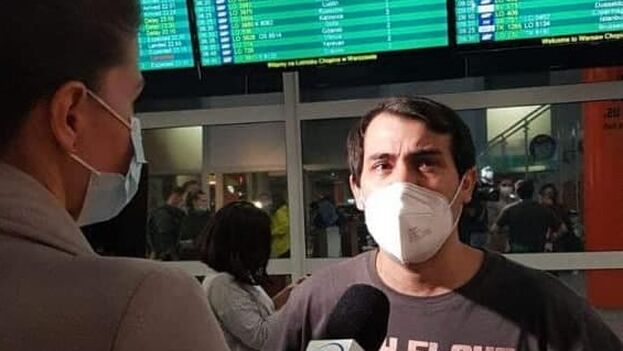
![]() 14ymedio, Havana, Cuba | 26 September 2021 — Hamlet Lavastida was released this Saturday and taken to José Martí International Airport in Havana, where he boarded a plane bound for Poland. After more than three months of detention in Villa Marista prison, the artist left the island along with his girlfriend, poet Katherine Bisquet Rodríguez, as confirmed to 14ymedio by the artist’s family.
14ymedio, Havana, Cuba | 26 September 2021 — Hamlet Lavastida was released this Saturday and taken to José Martí International Airport in Havana, where he boarded a plane bound for Poland. After more than three months of detention in Villa Marista prison, the artist left the island along with his girlfriend, poet Katherine Bisquet Rodríguez, as confirmed to 14ymedio by the artist’s family.
State Security took it upon themselves to manage Bisquet’s consular procedures, she said. The young man “was driven to the airport and guarded by more than twenty agents until he boarded the plane, telling him it was a ‘one-way trip’ without possibility of return.”
According to this same source, Lavastida and Bisquet would be making a stopover in Madrid and are expected to arrive in Warsaw in the next few hours. “It was all done with a lot of secrecy by the political police and we are waiting for Lavastida to be in free territory so he can recount more of the details,” they added.
Upon arriving in Europe this Sunday, Bisquet published a post on her Facebook page in which she said that their exile was the “only option for Hamlet’s release from prison.”
“They have violated us, they have expatriated us, they have murdered us, they have imprisoned us, they have censored us, and it has all been done quietly, closely, in our backyard, in our own house”
The poet explained that Lavastida was taken by State Security to the airport Saturday afternoon, from a protocol house where he had been isolated since September 20 “and the location of which is unknown” because “he was transported there with his head between his legs.”
She said she was also transferred to the airport terminal by the political police “without allowing my father and family to take me there and bid me farewell.” State Security was in charge of all her immigration procedures.
“There is no justification that can even come close to disguising the macabre plan that their political power has unleashed over our lives. They’ve named this plan ‘political rationality’. On several occasions I’ve heard more than one agent say that it was not useful to have Hamlet imprisoned and that, as a result of this ‘political rationality’, they decided to release him on the condition that we both leave the country,” she wrote.
Bisquet said that they both have “many things to do, many things to build.” She took the opportunity to announce that “after a brief recovery” from everything they’ve experienced, they will be providing their testimonies.
“They have violated us, they have expatriated us, they have murdered us, they have imprisoned us, they have censored us, and it all has been done quietly, closely, in our backyard, in our own house,” she said, but she also said that today in Cuba “the people are alive” and in “these last few months something has changed “,” there is a growing force. A force that is accumulating within us.”
“Nothing will go unpunished. Every act of repression and every humiliation against our lives will have a translation in an important part of my literature. Every detail, every word, every gesture, every body,” said Bisquet.
Lavastida had returned to Cuba from Germany on June 21st, after finishing his residency at the Künstlerhaus Bethanien gallery in Berlin. After completing the regulatory period of isolation, he was arrested on June 26th as he exited the government isolation center in the Flores neighborhood of the capital, and transferred by State Security to Villa Marista prison. The authorities informed his family that he was under “investigation” for the alleged offense of “instigating a crime.”
The 38-year-old artist, declared a prisoner of conscience by Amnesty International, is one of the most relevant creators of his generation
The 38-year-old artist, declared a prisoner of conscience by Amnesty International, is one of the most relevant creators of his generation and in recent months has maintained a confrontational discourse against the regime by denouncing the repression his Cuban colleagues experienced, especially since November 27th. Between 2011 and 2015, he resided outside the island and was prohibited entry into the country as a result of public statements that upset the authorities.
State Security made it known that he was being investigated for an exchange that took place in a private group chat of opposition artists–27N–on Telegram, where he proposed marking banknotes with the logos of San Isidro Movement and 27N, an initiative that did not come to bear.
Known for his critical works, the Cuban government believes Lavastida “has been inciting and calling for acts of civil disobedience on public roads, using social media networks and directly influencing others,” as published on Razones de Cuba, a government website.
Human Rights Watch, PEN America and PEN International all condemned his arrest and demanded his unconditional release, as did dozens of artists and activists inside and outside the island, including Lester Álvarez, who stated that the only reason Lavastida was under arrest was for “freely expressing his opinion on the authoritarianism of the Cuban government.”
During the artist’s imprisonment in Villa Marista prison, he was denied four requests for a change of precautionary measures and three complaints. Furthermore, he was infected with COVID-19 and transferred to an isolation center without notifying his family.
Translated by: Silvia Suárez
____________
COLLABORATE WITH OUR WORK: The 14ymedio team is committed to practicing serious journalism that reflects Cuba’s reality in all its depth. Thank you for joining us on this long journey. We invite you to continue supporting us by becoming a member of 14ymedio now. Together we can continue transforming journalism in Cuba.
